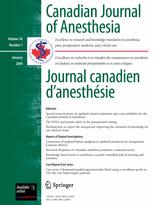
ARTHROPLASTY
Efficacy of dexmedetomidine vs. placebo for postoperative opioid use after TKA
This report has been verified
by one or more authors of the
original publication.
Can J Anaesth. 2016 May;63(5):569-576.
40 patients scheduled for primary unilateral TKA were randomized to undergo the procedure with spinal anaesthesia with or without a loading dose of intravenous dexmedetomidine. The purpose of this study was to determine if dexmedetomidine was associated with significantly decreased postoperative consumption of morphine when compared to placebo up to 24 hours postoperatively. Secondary outcomes of interest included time to first analgesic request (PCA), pain experienced at rest, time to discharge from PACU, patient satisfaction with analgesia, hemodynamic and respiratory changes, and opioid-related adverse effects. Results demonstrated that patients in the dexmedetomidine group had significantly lower mean cumulative morphine consumption at 6, 12, and 24 hours. Additionally, patients treated with dexmedetomidine were observed with significantly delayed time until first analgesic request, a lower number of cases of itchiness and nausea/vomiting, lower intraoperative mean arterial pressure, longer time to PACU discharge, and greater patient satisfaction.
Unlock the full ACE Report
You have access to {0} free articles per month.Click below to unlock and view this {1}
Unlock NowCritical appraisals of the latest, high-impact randomized controlled trials and systematic reviews in orthopaedics
Access to OrthoEvidence podcast content, including collaborations with the Journal of Bone and Joint Surgery, interviews with internationally recognized surgeons, and roundtable discussions on orthopaedic news and topics
Subscription to The Pulse, a twice-weekly evidence-based newsletter designed to help you make better clinical decisions
Exclusive access to original content articles, including in-house systematic reviews, and articles on health research methods and hot orthopaedic topics
Or upgrade today and gain access to all OrthoEvidence content for just $1.99 per week.
Already have an account? Log in


Subscribe to "The Pulse"
Evidence-Based Orthopaedics direct to your inbox.
{0} of {1} free articles
Become an OrthoEvidence Premium Member. Expand your perspective with high-quality evidence.
Upgrade Now













































































